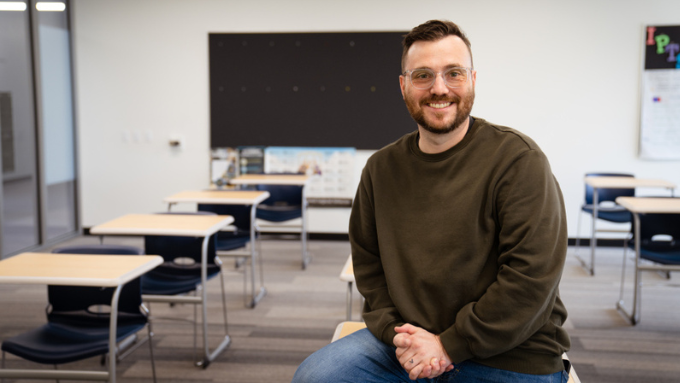RVC-Professor-Awarded-Grant-to-Preserve-Rockford-Education-Desegregation-Stories.php
RVC Professor Awarded Grant to Preserve Rockford Education Desegregation Stories
Dr. Mathew Oakes has been awarded a National Endowment for the Humanities (NEH) Grant for a two-year oral history, archival, and instructional project on the legal and community history of desegregation and education in Rockford. The $60,000 grant will fund his project, “Chronicles of Change: Archiving Stories of Desegregation in Rockford Public Schools, 1989-2002.”

Dr. Mathew Oakes, recipient of a National Endowment for the Humanities Grant
Oakes will serve as the Project Director and will be joined by RVC colleagues Professor Theresa Paulette Gilbert (Project Advisor), Lukas Wenner (Archivist), and Nathan Talan (Videographer).
This passion project bubbled out of Oakes' curiosity, who is not originally from the Rockford area. “As I've learned more about the community over the years, the desegregation period is something that comes up, but no one seems to have the whole story. I hope to respond to a gap in our public understanding of a crucial period in our communal history.”
The grant will allow Oakes to decrease his teaching schedule to focus on this research project. The topic of desegregation in the Rockford community in the 1990s is a major part of our community’s history. The NEH grant provides weight and credibility to the topic.
Oakes’ project is one of 238 nationwide projects selected to receive a portion of $26.2 million in funding from the NEH. The highly competitive grants go through several levels of review before awarding. All grant applications are first peer-reviewed, meaning panels of experts in the relevant fields read and review each application and make recommendations to the NEH. Second, staff at the NEH review recommended peer-reviewed applications and make recommendations to the National Council on the Humanities. The Council then provides recommendations to the NEH Chair, who deliberates and determines which applications will receive public support.
“From studies of the impact of emerging technologies on humans to new documentaries that lift up under-told stories, these projects show how the humanities help us understand ourselves and our world,” said NEH Chair Shelly C. Lowe (Navajo). “NEH is proud to support 238 exemplary new education, preservation, research, and public programs that will expand our nation’s cultural resources and foster learning in communities across the country.”
According to NEH, “Grant awards support humanities exhibitions and documentaries, programs at colleges and universities, expanding access to historical collections, sustainability projects at museums and archives, and scholarly research in the humanities.”
This project is both professional and personal for Oakes.
I am a scholar of language and power and forever a student of Black American thought and history. Personally, I have a fervent commitment that my work will always serve the Good. I hope this project does that.
In addition to working with his RVC colleagues, Oakes will engage students in this project. The team will hire student workers and weave this into the classroom learning experiences.
“I'm looking forward to breaking down that barrier between college and community and working with my students on a learning project that carries such weight and importance,” said Oakes.
The two-year project will kick off this July as the team heads to the archives at Northern Illinois University. The team will sift through legal documents from the People Who Care case and make a list of initial community members to interview. The project will conclude in June 2026.
Oakes is hopeful that this project will aid in the healing of our community.
“Too often, we think about segregation and desegregation as something that stopped in the 1960s during the Civil Rights era, but in reality, de facto and de jure segregation persist today. If we want to create the kind of multiracial democracy that Dr. King called the Beloved Community, we have to listen to each other's stories and find common ground. This is the hard work of peace. I hope this project plays a role in it.”
About the National Endowment for the Humanities:
Created in 1965 as an independent federal agency, the National Endowment for the Humanities supports research and learning in history, literature, philosophy, and other areas of the humanities by funding selected, peer-reviewed proposals from around the nation. Additional information about the National Endowment for the Humanities and its grant programs is available at www.neh.gov.
Media Contact
- RVC Public Relations
- (815) 921-4510
- Email RVC Public Relations
- RVC Communications Page

